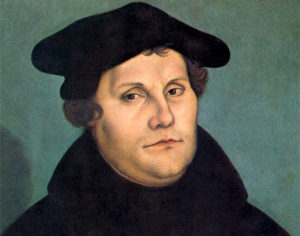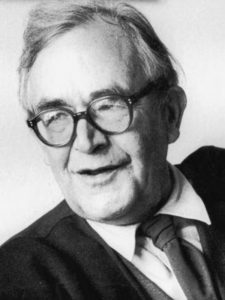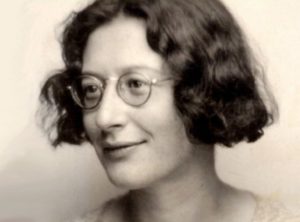Reading Time: 14 minutes
SUMMARY
The question of vocation–what it is, and how we should pursue it–crops up all the time in the Christian life. Though countless theologians have studied it, there are four whose perspectives are particularly helpful: Martin Luther, Karl Barth, Simone Weil, and Andrew Davison. These four thinkers, presented in chronological order, can help us order our thoughts about the topic, and bring us closer to understanding our callings as Christ-followers.
INTRODUCTION
I can still remember where I was when I first read Thomas Merton. Sitting on the floor of my freshman dorm with his essay “Things in Their Identity” in front of me, I was shaken to my core. For most, the first year of college feels like the precipice of life itself, feeding unanswerable questions about career and vocation to students who hardly know where to begin. One month into my freshman year at Wheaton College saw me already losing sleep over my major, next summer’s internship, and future career plans.
But Merton quieted all of these questions with paragraphs that fell on me like epiphanies. These sentences hit home: “No two created beings are exactly alike. And their individuality is no imperfection. On the contrary, the perfection of each created thing is… in its own individual identity with itself.” Discovering oneself in discovering the divine, removing our human-made masks of sin and contradiction, working with God to create true identity–these were concepts that I was eager to wrestle with. This thing that Merton called vocation–working together with God in the creation of our own life, our own identity–was something I desperately wanted.
The term vocation has a fascinating history. Though centuries of conversation have shaped and reformed its definition, the word originates from the Latin vocare, which means “to call, name, or invoke.” It also has roots in the Vulgate translation of Paul’s term klese, which is Greek for “call.” This is the same word that ekklessia, translated in English as “church”, comes from. In fact, for a few centuries, the term vocation was used exclusively to talk about a Christian’s calling to vocational ministry, leadership, or celibacy within the Church¹. The definition has since been broadened by many to include the entire body of Christ, whatever their careers may be. But even in its modern sense, the concept of vocation is connected to ekklessia. The church is a community made up of called individuals, united by their common pursuit of those callings.
With that in mind, the question of whether Christians are called is hard to argue. The vocation conversation has very little to do with whether vocation exists, but rather with questions like: Is there one particular career that God wants me to pursue? Have I chosen the wrong job and ignored God’s calling? What is vocation, and how do I find out what mine is? This string of questions can isolate us and keep us quiet if we let it. But in reality, wrestling with this topic is common and innately human. It is in our imago Dei nature to wonder how we can best bear God’s image in life and career. The following four thinkers have been especially helpful in bringing the topic out of the shadows, and presenting vocation as an issue that every human should think about.
MARTIN LUTHER, 1483-1546
“Faith active in love through one’s callings”: this was a catchphrase born out of the Protestant Reformation². One of the goals of the Protestant Reformation movement was to broaden the definition of vocation to include all callings. At the time, the Catholic Church taught that only monastic and ecclesial positions were vocational. Martin Luther’s doctrine of vocation arose out of a strong conviction that this teaching had no Biblical foundation.

Martin Luther
In Luther’s opinion, there was potential for holiness in every activity from shoemaker to secluded monk. This radical, Kingdom-oriented vision of career not only challenged the Catholic Church to rethink their doctrine, but also revitalized a worldview that had been stifled by the Catholic definition of vocation. In setting monasticism and papacy apart as the only God-given callings, the Church had built dividing walls between secularism and religion. The Medieval Catholic way of thinking about vocation had caused an acute separation of church and state. To Luther, the dichotomy seemed unbiblical and less than God’s plan for all aspects of creation–especially humans, who are made in His very image–to glorify and reflect their Creator. He sought to restore dignity to the mundane and everyday jobs that the church had disregarded as non vocational.
The Reformers’ doctrine of vocation acknowledges that God is present in all of creation, and celebrates the active component of faith that is lived out ”in love through one’s callings.”² There is a challenge at the heart of this definition. To everyone feeling uncalled or misplaced, Luther writes,
“Picture before you the humblest state… See, as no one is without some commission and calling, so no one is without some kind of work… Serve God and keep His commandments; then… all time will be too short, all places too cramped, all resources of help too weak.”²
In this inclusive imagination of the world, in which no one is without a calling, dignity is given back to both the work and the workers of mundane and menial jobs. More importantly, authority is given back to God. He speaks through everyone, not just the select religious leaders and thinkers. Each job, according to Luther, is an outlet for the voice of God to speak.
This shifts the responsibility of representation off of the worker and onto the divine. Luther’s definition of vocation asks Christians to stop seeing career as a place for self-expression, and instead see it as a platform for God to be represented and made known. In this Heavenly perspective, there is relief for Christians from the expectations put on them by the modern, secular view of calling. The call to act as God’s envoy should edge out the worldly pressure to land a job that braids together one’s talents and passions perfectly. Luther’s point was simple, but demanded action: every job is vocational, and so deserves to be done faithfully.
KARL BARTH, 1886-1968
Of course, Luther’s view had its fair share of challengers. One of the most prominent critics, Karl Barth, actually belonged to the Swiss Reformed tradition. Barth lived and wrote more than 400 years after the Reformation took place, so his definition of vocation arose out of a very different cultural and political climate than Luther’s.

Karl Barth
He argued that the Reformed church had committed a serious crime in letting work be synonymous with vocation. Barth scholar Douglas J. Schuurman writes, “Calling work–and any other mundane moral sphere–a vocation superimposes upon it a ‘superfluous’ and perhaps dangerous spiritual decoration.” Barth saw calling as more related to the doctrine of election (i.e. God calling some but not others) and the general directive found in the New Testament to take up one’s cross and follow Christ. It was the divine and special calling to Christianity that Barth termed “vocation”; any other use of the word seemed too liberal.
His definition is founded in the word’s original Greek root, which ties vocation to the Church and the Christian religion. Instead of vocation making all mundane things matter, Barth saw vocation as a reality that made the mundane not matter. The calling of a Christian is to be a Christian–no careers or qualifiers attached. Jobs should neither matter to that vocation nor interfere with it.
In his eyes, the holiness with which Luther coated every kind of work was unbiblical and non vocational. He couldn’t see the connection between mundane labor and divine direction. Actually, he describes the divine as slashing diagonally across the spheres of human life, cancelling out the significance that Luther had assigned them: “Thus the New Testament klesis has nothing to do with the divine confirmation of these spheres as such, nor with the direction to enter such a sphere, or more particularly to enter a special sphere of work.” Barth was generally unconcerned with the what as well as the how that Luther hones in on. In his own definition, he keeps the scope of vocation focused on the Church, the called and cross-bearing body of believers.
Using 1 Peter 2:9 as grounds for his argument, he says that the identity a Christian gains in baptism is the central part of his or her vocation. In baptism, believers announce and accept their place in “a chosen race and God’s own people,” whose job it is to “proclaim the mighty acts of Him who called you out of darkness and into His marvellous light.” Baptism is the definitive beginning of a Christ-follower’s vocation, and should be the theme of everything they say and do. From then on, we have the responsibility to function as a part of the body of Christ. Barth rejects Luther’s urge to go around hunting for the divine within all different kinds of callings. His definition of vocation asks us to flip Luther’s and instead, begin to see our calling as within the divine. God has selected and singled us out for Himself. Barth reminds us to live into that chosenness.
SIMONE WEIL, 1909-1943
Also writing in the 20th century, Simone Weil was a French philosopher and mystic whose reflections on God, religion, the human, and the world were ahead of her time. In fact, her writing did not gain popularity until about ten years after she died. The majority of Weil’s convictions about vocation arose from the strong and specific calling she felt on her own life to write.

Simone Weil
In her definition of vocation, the what (the specific career or job that one works) carries weight, and matters much for any person seeking to serve God well. Weil writes, “The carrying out of a vocation differed from the actions dictated by reason or inclination. … The most beautiful life possible has always seemed to me to be one where everything is determined, either by the pressure of circumstances or by impulses such as I have just mentioned, and where there is never any room for choice.”³ In Weil’s vision of vocation, obedience and attentiveness are the human’s primary responsibilities. If they are listening well enough, long enough, God will reveal a specific calling to each of His people.
She found her calling in words and ideas, but believed that even physical labor was not menial and had the potential to be vocational. God invented and assigned both kinds of work to Adam and Eve, asking them to use their intellect for naming creatures and their hands for tending the garden. In Eden, both of these vocations were sacred. She saw work as a sacrament. Like Luther, Weil believed that every job was dignified, holy, and inhabitable by God. One’s calling—whether it be manual labor or some intellectual pursuit—has the potential to function like a sacrament: a visible sign of an invisible reality. Her vision of work was not some mundane and secular activity, but rather a sacred and God-filled practice. In whatever a person’s specific calling is, there are opportunities to treat it with Edenic sacredness and notice the hand of God moving through His people’s obedience.
Vocation is endlessly, eternally important to mystics, and Weil was no exception. Weil once wrote, “[Our dignity] consists in this, that in the state of perfection, which is the vocation of each one of us, we no longer live in ourselves, but Christ lives in us.”³ She saw calling as a riddling, life-long process of finding God in order to find herself. When she searched for Him and obeyed His call on her life to write, she found herself. In turn, writing helped her to better seek and find Him. This double-search of God and self is what Weil calls vocation. She reminds readers that the Christian faith is not passive, and challenges them to be active in pursuing the double-search. Vocation, for Weil, requires proactiveness and persistence. Sitting back in the knowledge that we are saved does not bring us any closer to discovering the unique purpose God wants us to accomplish on earth. Each of us must stay attentive and obedient to God’s specific, unique calling on our lives.
ANDREW DAVISON, Present
Rev. Dr. Andrew Davison thinks much more ideologically about the topic. For him, vocation is about “finding what it is that would make sense of us.”⁴ Davison currently teaches at the University of Cambridge, but before his career there, he spent several years serving as the junior chaplain at his alma mater, Merton College. It was there that he wrote “Christian Vocation in General”, his crash course on the topic. In his paper, he paints a picture of vocation that has little to do with the specific way someone earns a living. His way of thinking Christianly about it is to focus on the ways it influences personhood and identity. That kind of focus makes vocation’s crux the issue of who we are made to be, rather than what we are made to do for a career.

Andrew Davison
Simply, his definition starts with a human being’s acknowledgment of their own “creatureness.” Before understanding anything else, we must understand that we’re created beings. Genesis tells us that God breathed into the dust of the earth and brought us from nothing into something. So we are creatures who were brought into being by a greater, all-knowing, and unmade Creator. Humility and gratitude should flow from that realization; in the words of Davison, “Our first vocation is to be grateful. A large part of the religious impulse, and of our religious duty, is to be thankful to God. We are thankful for a gift that we could not possibly repay.”⁴ (Read more about theories of atonement and how to view the gift of salvation here.) Before vocation can mean anything else, it must be made a synonym for gratitude and humility.
There are two different callings in Davison’s essay that, together, point Christians toward their prospective vocations: creation’s calling and redemption’s calling. The call of creation prompts each person to first look inward at the image of God inside of them, and then to look outward at the world where God wants them to leave their unique mark. Through creation, God called us out of nothing and into something, and vocation is discovering what that something is. Davison says it beautifully: “Vocation is a discernment of charism [or talent]. We explore what it means for God to have given us the gift of the nature that we have. From that, we wonder how we could make that into a gift for our fellow human beings, for the church and for the world at large.”⁴ The call of creation is to wonder–the kind of wonder that marvels at God’s goodness in giving each of His creatures unique talents, as well as the kind that is curious about how His creatures should respond, revel in, and give back those gifts.
Redemption’s calling is the other half of Davison’s definition. Like Barth, he uses 1 Peter 2:9 as his jumping-off point. Once Christians embrace the redemption that Jesus offered on the cross, publically committing to life with Him through baptism, a new calling on their life emerges. The apostle Peter says this calling is to “declare the praises of him who called you out of darkness into his wonderful light.” In the redeemed and reclaimed identity that the cross gives Christians, there are directions for how they should act; who and how they should become. Davison deemphasizes what humans do in order to reemphasize the way they should do it, echoing Paul’s words in Colossians 3:23: “Whatever you do, work at it with all your heart.”
Of course, the calls of creation and redemption need to be fleshed out at work, in relationships, and in the church. Vocation can take a lot of different shapes and forms depending on someone’s personality, age, and position. There are endless possibilities for how a human might accept, live into, and work out the two calls of vocation named by Davison. But discovering the what component is relatively unimportant. Like Luther, he challenges Christians to see opportunities for vocational living in every sphere of life. Davison writes, “Whatever our work may be, it should allow us to communicate God’s goodness to others, just as God communicated his goodness to the world in creation.”⁴ In other words, we fulfill our vocation when we stop obsessing over what to do, and instead focus our energy on how to do it: with excellence, gratitude, humility, and wonder.
CONCLUSION
Often, it seems like discontentment is the easiest reaction to the question of vocation–feeling like no job is a perfect fit, and interpreting those feelings to mean that vocation is either non-existent or unattainable. Though all four scholars have different approaches to defining the concept of vocation, none of them would argue that it is selective or unreachable in nature. Vocation is accessible, a call from God on every person’s life that is waiting to be lived out, no matter a person’s status or class.
Theologians debate several aspects of the topic, but the important point agreed upon by all four scholars above is that every Christian has been called; whether it is toward a specific career path, toward greater devotion to the Christian life of ministry and discipleship, or toward Luther’s vision of a general kind of acting and living in all activity, the response must be obedience. These questions of vocation are relevant to ask and answer as individuals made in God’s image. But it is perhaps even more important that the Church obey its corporate calling: regardless of what we are called to individually, we must work together to be the hands and feet and heart and mind of Christ. In Christian Vocation in General, Davison writes something that I doubt any of his fellow vocation scholars would argue with: “Our calling is nothing less than to play our part in the drama of the Church, our part in its life and purpose.”
Which view of these have you not heard before? What struck you or confused you? Share below in the comments!
Recommended Related Articles
- How Did Jesus Really Save Us? Exploring the Top Theories of Atonement
- Solving the Body-Soul Problem
- How Does the Christian Faith Relate to Our Race and Identity? James Cone and His Critics
Footnotes:
¹ Bennett, Gaymon. Technicians of Human Dignity: Bodies, Souls, and the Making of Intrinsic Worth.
² Schuurman, Douglas J. “Protestant Vocation Under Assault: Can It Be Salvaged?”
³ Dunaway, John Marson. “Toward a Weilian Philosophy of Vocation.”
⁴ Davison, Andrew. “Christian Vocation in General.”
About the Author: Delaney Young lives in Chicago. She is studying English writing at Wheaton College with a focus on creative storytelling.

